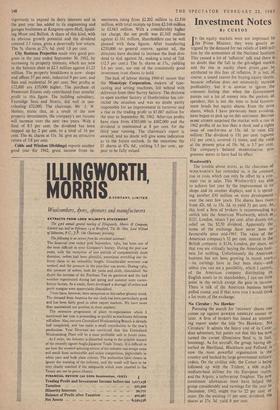Investment Notes
By CUSTOS
IF the equity Markets were not impressed by the Prime Minister, they were greatly in- • trigued by the demand for tax reliefs of £400 mil- lion by the economists of the National Institute.
This caused a lot of 'inflation' talk and there is no doubt that the fall in the gilt-edged market and the rise in equity share prices can be attributed to this fear of inflation. It is not, of course, a sound reason for buying equity shares, because inflation does not necessarily increase profitability, but it is unwise to ignore the common feeling that when the Government pumps out a lot of money into the pockets of spenders, this is not the time to hold Govern- ment bonds but equity shares. Even the store shares, which I have previously been avoiding, have begun to pick up on this sentiment. BRITISH HOME STORES surprised the market with a rise in 1962 profits of no less than a third, and a rights issue of one-for-ten at 13s. 6d. to raise £21 million. The dividend is 13-1- per cent. (against 111 per cent.), covered 14- times, and the yield at the present price of 18s. 9d. is 3.7 per cent. The company's belated modernisation pro- gramme seems to have had its effect.
Woolworth's
The trouble about stores, as the chairman of WOOLWORTH'S has reminded us, is the constant
rise in costs which can only be offset by a con- stant rise in sales. This Woolworth's was able to achieve last year by the improvement in its shops and its counter displays, and it is spend- ing another £30 million on store development over the next few years. The shares have risen
from 42s. 6d. to 53s. 3d. to yield 31 per cent. At this level a firm of brokers is recommending a, switch into the American Woolworth, which at $121, London, return 5 per cent. after double tax relief on the $2.50 dividend. Apparently the terms of the- exchange have never been so favourable since mid-1961. The value of the American company's 52 per cent, interest in the British company is $134, London, per share, so that you arevirtually buying the American busi- ness for nothing. Unfortunately the American business has not been growing in recent years -its earnings have in fact been static-and unless you can see a possibility, which I cannot, of the American company distributing its English assets to its shareholders, I can see little 'point in the switch except the gain in income. There is talk of the American business being pulled round, and if that were true I would think a lot more. of the exchange.
No Circular : No Hawker
Pursuing the search for 'recovery' shares one comes up against HAWKER SIDDELEY sooner or later. A firm of brokers has issued an interest-. ing report under the title 'No Hawkers: No Circulars.' It admits the heavy cost of its Cana- dian adventure, but points out that this has now turned the corner (Dominion Steel is, in fact, booming). As for aircraft, the group, having ab- sorbed de Havilland, Blackburn and Folland, is now• the most powerful organisation in the country and backed by large government military orders. On the civilian side, the Comet is being followed up with the Trident, a 600 m.p.h. medium-haul airliner for the European routes. and the Argosy, a turbo-prop. freighter. The new investment allowances must have helped the group considerably and earnings for the year to December, 1962, might rise to 22 per cent. or more. On the existing 11" per cent. dividend, the shares at 27s. 3d. yield 8 per cent.


































 Previous page
Previous page